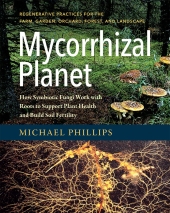posted 8 years ago
Trees like and need fungi rich soils, particularly mycorrhizal fungi.
These fungi invade the roots, going into and between the rood cells where they live symbiotically with the root, providing access to minerals and water that the naked root would not have access to.
Fungi need bacteria, bacteria are what break down minerals into parts that the fungi can take in and make use of.
Bacteria also work along with the fungi to create soil tilth, the friablility of soil all gardeners are so keen to have since it is what allows plants to thrive by putting out more roots and so grow strong and disease resistant.
Really good soil has many components; minerals, carbon, calcium, copper, boron, phosphates, the other well known "fertilizer" components, along with vitamins which are produced by the micro organisms and earth worms, presto you have soil that will be able to produce super tasting, nutritious things to eat.
Many people have the idea that compost is a necessary thing to add to soils. While it is a great amendment, unless you have built that compost to contain all the trace minerals and other "building blocks" needed for healthy life forms, it takes an astronomical amount of "weak" compost to do the job.
The ideal compost will contain all the items required, this is rarely the case however.
If you love compost and want to make it the best it can be, then you will be adding items like; egg shells, manures (all types) vegetable scraps (including mushroom parts) just about anything that will decompose can go into a hot compost heap.
When I make compost (and I am making it all the time) I not only add all the above items mentioned, but I even use up out of date multi-mineral vitamins by dissolving them in warm water then pouring that over the heap.
I also compost meats and pet manures in a special, super hot compost heap prior to adding that heap to a "normal" heap, by using a multiple stage decomposition process to make my compost, it chemically tests out to very complete nutrient wise for my garden beds.
I also have a habit of adding mycorrhizal fungi and other fungi to my compost heaps via "slurry" method, I don't worry so much about adding bacteria, those seem to always find their way into a freshly made heap.
A little Agar in a few petri dishes with some of your compost rubbed on then covered and incubated will show you if you have both, bacteria and fungi in your compost pile.
Normal soil testing will give you many clues about what your soil needs added to become "super soil", if you add in mineral tests or "nutrient" tests, you will have a complete or nearly complete soil profile to work from.
Redhawk







